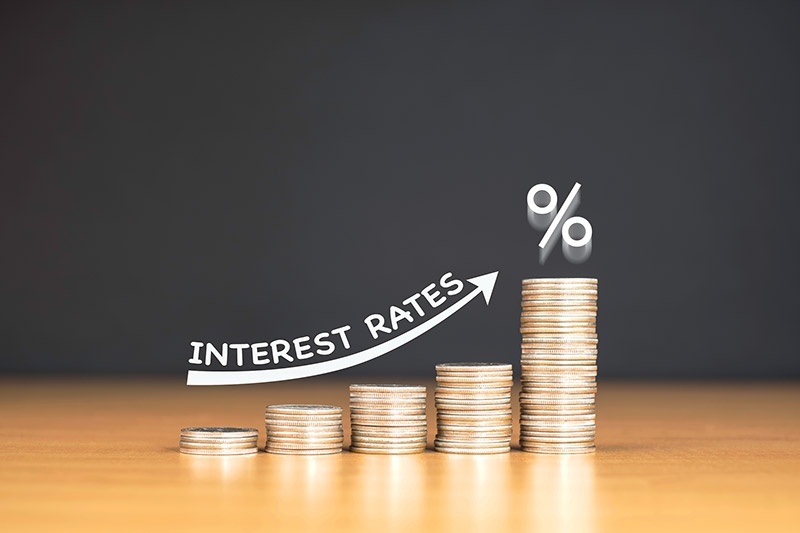Vietnam in good stead as Fed takes big action
 |
| Rising interest rates are putting pressure on central banks worldwide, Photo: Shutterstock |
The Federal Open Market Committee officially announced the base interest rate – referring to the decision on interest rates on home loans, credit cards, and many other loans – at 1.5-1.75 per cent, the highest since the coronavirus pandemic broke out on a global scale in 2020.
The Fed’s decision comes amid a more than 40-year peak in inflation. It has raised interest rates aimed at reducing market demand and narrowing the supply-demand gap.
Le Thanh Hoa, analyst at Bao Viet Securities Company, said that the Fed’s interest rate hike might have a rather negative influence on the overseas investment of international groups.
“Higher interest rates pose a few challenges, the most significant of which is that they have the effect of lowering the value of other currencies in comparison to the USD. This makes it more difficult and expensive to make payments on existing debt and frequently results in an exodus of capital investment from emerging markets, including Vietnam,” he said. “Capital inflows to emerging markets have shown signs of drying up.”
According to projections made by Pham Chi Quang, who serves as deputy director in charge of the Monetary Policy Department at the State Bank of Vietnam (SBV), there were 113 interest rate hikes around the world in 2021 alone.
In the meantime, in order to provide support for local businesses and the economy as a whole, the SBV and commercial banks have continued to lower the interest rates that are charged on loans, which is also the largest rate cut in ASEAN.
“In the first five months of 2022, there have already been 144 rate hikes around the world,” Quang said. “Maintaining the current interest rate level represents a significant effort of the local authorities to maintain reasonable lending interest rates without burdening investors’ financial costs,” he said.
In a broader context, HSBC predicted that ASEAN is on track for a promising economic recovery, fuelled by the relaxation of pandemic-related restrictions. The domestic demand has seen a strong rebound.
Meanwhile, despite headwinds in global trade, shipments from a number of ASEAN economies are likely to hold up well. Indonesia and Malaysia, for example, will benefit significantly from soaring commodity prices, while Singapore and Vietnam will continue to be able to take advantage of the strong, though moderating, momentum in the extended tech cycle.
“The SBV is also on track for monetary policy normalisation. Thanks to impressive exports and recovering private consumption, Vietnam’s growth is poised to return to its pre-pandemic pace,” HSBC noted. “While inflation remains well below the SBV’s 4 per cent inflation target for now, we expect persistent high energy prices to continue driving up headline prices, likely temporarily breaching the 4 per cent ceiling in the second half of 2022. This may prompt the SBV to deliver a possible 50 basis points rate hike in Q3, before delivering three more hikes of 25 basis points in 2023.”
The banks also stated that in Vietnam, a hike in energy price has also been persistent. Transport prices rose to record highs, replacing food inflation as the main driver of Vietnam’s headline inflation. On top of surging global oil prices, a domestic petroleum supply shortage has exacerbated Vietnam’s energy crunch.
Since January, Vietnam’s largest refiner, Nghi Son Refinery and Petrochemical LLC, has been running at a reduced operating rate, coming close to a shutdown in February, before improving to about 80 per cent capacity in March.
“This has forced the authorities to look for alternatives to alleviate the energy pressure. The government pledged to import an additional 2.4 million cu.m of petroleum in the second quarter, which is already reflected in Vietnam’s rising imports data,” HSBC said. “Meanwhile, since April 1, the government has also cut environment protection tax, the largest of all taxes and fees on fuel and gasoline. Despite elevated energy prices, moderate food inflation has so far helped to curb the overall rise in headline inflation.”
What the stars mean:
★ Poor ★ ★ Promising ★★★ Good ★★★★ Very good ★★★★★ Exceptional
Related Contents
Latest News
More News
- Cashless payments hit 28 times GDP in 2025 (February 04, 2026 | 18:09)
- SSIAM and DBJ launch Japan Vietnam Capital Fund (February 04, 2026 | 15:57)
- Banks target stronger profits, credit growth in 2026 (February 04, 2026 | 15:43)
- Vietnam on path to investment-grade rating (February 03, 2026 | 13:07)
- Consumer finance sector posts sharp profit growth (February 03, 2026 | 13:05)
- Insurance market building the next chapter of protection (February 02, 2026 | 11:16)
- NAB Innovation Centre underscores Vietnam’s appeal for tech investment (January 30, 2026 | 11:16)
- Vietnam strengthens public debt management with World Bank and IMF (January 30, 2026 | 11:00)
- Corporate bond market poised for stronger growth cycle (January 28, 2026 | 17:13)
- Vietnam's IPO market on recovery trajectory (January 28, 2026 | 17:04)

 Tag:
Tag:


















 Mobile Version
Mobile Version